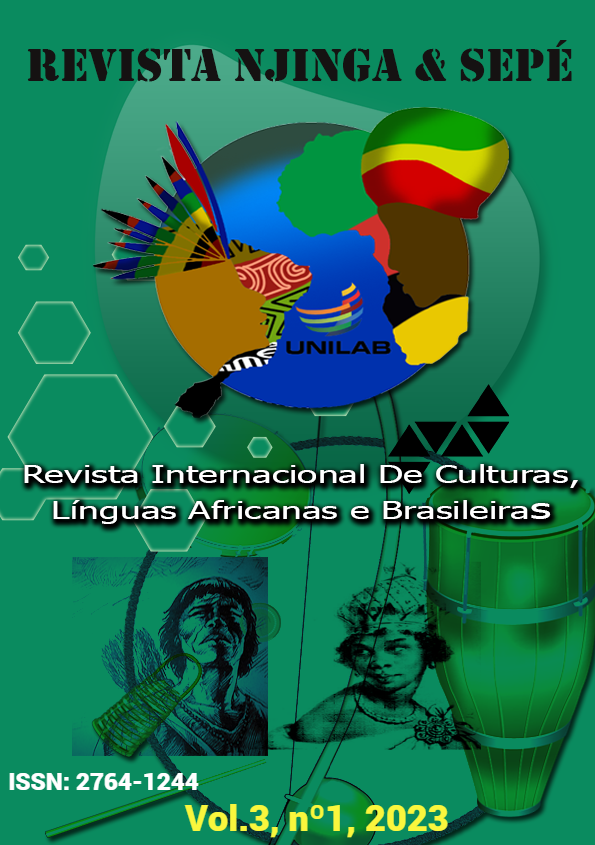Tradução de um artigo da Constituição Federal para a língua Maxakali: limitações e desafios do processo de tradução para uma língua indígena
Keywords:
Artigo 231, Constituição Federal, Língua Maxakali, Tradução, Revitalização LinguísticaAbstract
This article aims at describing a translating experience undergone by the authors of the Article 231 of the Brazilian Federal Constitution into Maxakali, a Brazilian indigenous language spoken in Northeast of the state of Minas Gerais. The translation was performed within the scope of the Intercultural Graduation Course for Indigenous Educators of the Faculty of Education in the Federal University of Minas Gerais. The experience took place in one of the classes in the Maxakali village of Pradinho in 2019. The intention of carrying out this translation came from the interest of the students during one of the course meetings to understand the function of this Constitution’s article. The main goals of the translation were to make the Maxakali students aware of the article 231 and to enable its reading in Maxakali language, as a strategy to strengthen this language in relation to the majority language (Portuguese) through a wider offer of texts of different written genres in the language. The characteristics of the legal text and the reality to which it refers is strange and distant from the Maxakali reality. This imposes cultural and lexical challenges to the translation. These limitations required non-literal adaptation to the text and deletion of paragraphs that complement the article in the original version. This article reports difficulties that were found in the translation process and presents challenges for a future translation of the same article. Additionally, the reflections presented here may be useful for overall translation activities from majority languages towards minority languages and for research on translation related to strengthening policies on minorized languages.
Downloads
References
BOMFIM, Anari Braz. Patxohã, ‘Língua de Guerreiro’: um estudo sobre o processo de retomada da língua Pataxó. 2012, 127 p. (Dissertação de Mestrado). Salvador: Universidade Federal da Bahia (UFBA), 2012.
BRASIL. Constituição Federal de 1988. Brasília: Senado Federal, Artigo 231. Disponível em<http://www.senado.leg.br/atividade/const/con1988/con1988_26.08.2020/art_231_asp#:~:text=S%C3%A3o%20reconhecidos%20aos%20%C3%ADndios%20sua.respeitar%20todos%20os%20seus%20bens>. Acesso em 28.dez.2020.
CAMPOS, Carlo S. Práticas de letramento em português e em Maxakali em um curso de formação de educadores indígenas. In: SANTOS, Alana Driziê Gonzatti dos et al. (Org.). Anais Eletrônicos do V Seminário de Pesquisas em Letramento. Natal: UFRN, 2020, p.36-47.
CRYSTAL, David. Pequeno tratado da linguagem humana. Tradução de Gabriel Perissé. São Paulo: Saraiva, 2012.
D’ANGELIS, Wilmar R. Educação escolar e ameaças à sobrevivência das línguas indígenas no Brasil Meridional. In: D'ANGELIS, Wilmar R. (Org.). Aprisionando sonhos: a educação escolar indígena no Brasil. Campinas-SP: Curt Nimuendajú, 2012, p. 175-190.
_______. Línguas indígenas no Brasil: quantas eram, quantas são, quantas serão? In: D’ANGELIS, Wilmar R. (Org.). O que é revitalização de línguas indígenas: como fazemos. Campinas: Curt Nimuendajú, 2019, p. 13-28.
GUDSCHINSKY, Sara. C.; POPOVICH, Harold.; POPOVICH, Francis. Native reaction and phonetic similarity in Maxakali phonology. Language, 46 (1), 1970, p. 77-88.
IVO, Ivana Pereira. Revitalização de línguas indígenas: do que estamos falando? In: D’ANGELIS, Wilmar R. (Org.). O que é revitalização de línguas indígenas: como fazemos. Campinas-SP: Curt Nimuendajú, 2019, p.43-63.
KRAUSS, Michael. The world’s languages in crisis. Language, 68., 1992, p. 4-10.
LITTLE, P. E. Territórios sociais e povos tradicionais no Brasil: por uma antropologia da territorialidade. Anuário Antropológico, 28(1), 2018, p. 251-290. Disponível em < https://periodicos.unb.br/index.php/anuarioantropologico/article/view/6871> Acesso em 25.dez.2020.
MONSERRAT, Ruth. Por que, afinal, parece tão fácil abandonar a própria língua? In: COSTA, Consuelo P. G. (Org.). Pensando as línguas indígenas na Bahia: C-Indy em Vitória da Conquista. Campinas, São Paulo: Ed. Curt Nimuendajú, 2011, p. 9-17.
MOORE, Denny. As línguas indígenas no Brasil hoje. In: MELLO, H.; ALTENHOFEN, C.; RASO, T. (Org.). Os contatos linguísticos no Brasil. 1ª Edição. Belo Horizonte: Editora UFMG, 2011, p. 217-240.
NASCENTES, Antenor. O linguajar carioca. Rio de Janeiro: Organização Simões, 1953.
NELSON, Jessica Fae. Pataxó Hãhãhãe: Race, Indigeneity and Language Revitalization in the Brazilian Northeast. 2018, 309 p. (Tese de Doutorado). Universidade do Arizona, 2018.
RODRIGUES, Aryon Dall’Igna. Línguas indígenas: 500 anos de descobertas e perdas. D.E.L.T.A. São Paulo, v. 9, N.1, 1993, p. 83-103.
SACK, Robert David. Human territoriality: its theory and history. Cambridge: Cambridge University Press, 1986.
SIASI/SESAI. Quadro geral dos povos. Disponível em: <https://pib.socioambiental.org/pt/Quadro_Geral_dos_Povos>. Acesso em 27.dez.2020, 2014.
STORTO, Luciana. Línguas indígenas: tradição, universais e diversidade. 1ª edição. Campinas: Mercado das Letras, 2019.
Downloads
Published
How to Cite
Issue
Section
License
Copyright (c) 2023 NJINGA&SEPÉ: Revista Internacional de Culturas, Línguas Africanas e Brasileiras

This work is licensed under a Creative Commons Attribution-NonCommercial-NoDerivatives 4.0 International License.
Authors who publish in this journal agree to the following terms:
Authors maintain copyright and grant the journal the right to first publication, the work being simultaneously licensed under the Creative Commons Attribution License, which allows the sharing of the work with recognition of the authorship of the work and initial publication in this magazine.
Authors are authorized to assume additional contracts separately, for non-exclusive distribution of the version of the work published in this journal (eg, publishing in institutional repository or as a book chapter), with acknowledgment of authorship and initial publication in this journal.
Authors are permitted and encouraged to publish and distribute their work online (eg in institutional repositories or on their personal page) at any point before or during the editorial process, as this can generate productive changes, as well as increase impact and citation of the published work (See The Effect of Open Access).




